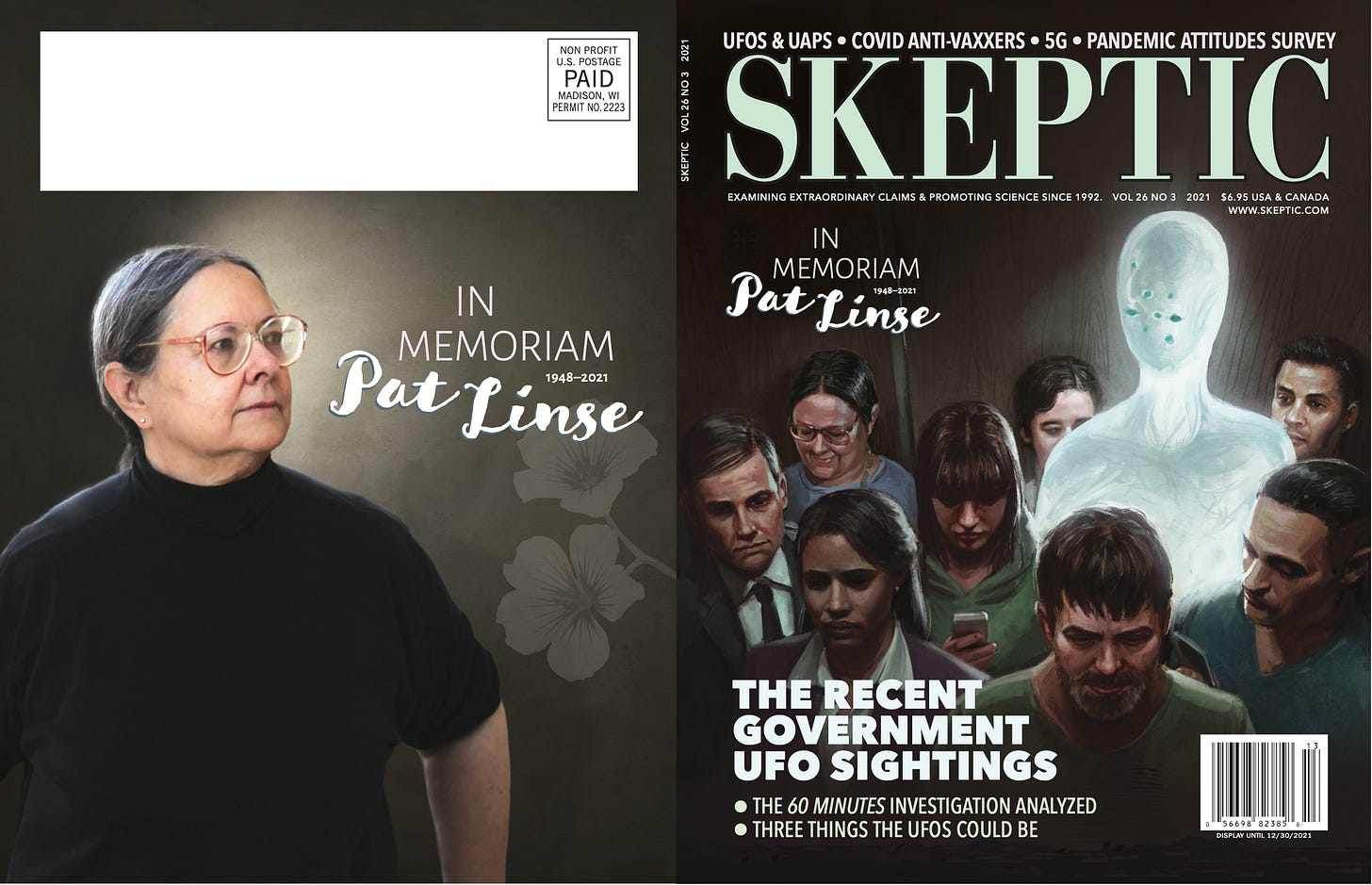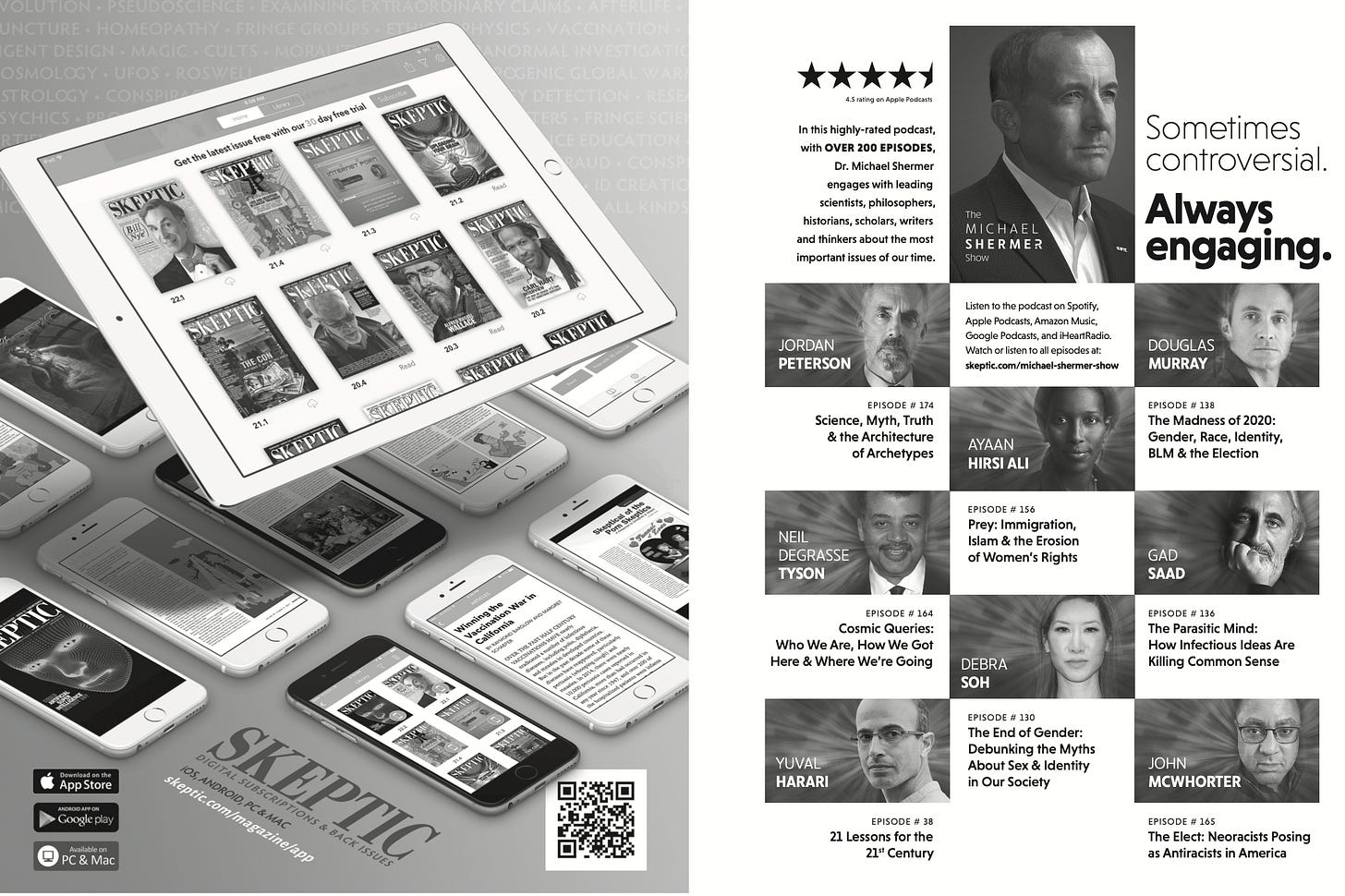Cancel Culture and Independent Media
Some thoughts on how culture and media have changed dramatically in 30 years
One of the first jobs I had after graduate school in 1978 (M.A., Experimental Psychology, California State University, Fullerton) was with a magazine called Bicycle Dealer Showcase, a trade publication for the cycling industry. As I was unable to find work as a full-time college professor at the time, that job launched me into a new career path as a professional cyclist competing in ultra-marathon cycling events, including centuries, double centuries, quadruple centuries, city-to-city records (San Francisco-to-Los Angeles, Seattle-to-San Diego, Miami-to-Portland Maine) and ultimately the 3,000-mile nonstop transcontinental bicycle Race Across America (RAAM).
That first job began in editorial and morphed into advertising and ultimately the business end of magazine publishing (which aided my later editing and publishing of Skeptic magazine, still going strong on this, our 30th anniversary), but my destiny was ultimately determined by my boss, his boss, and the owner of the company (Hester Communications, which published many such trade magazines). Often humming in the background noise of my mind was that I was not free to think, say, and do what I wanted. One day my cycling buddy John Marino, who at the time held the Guinness Book of Records time for cycling from Los Angeles to New York, came by my office to visit. There I was, metaphorically chained to my desk from 9-to-5, five days a week, while John was out riding his bike and enjoying his freedom in the glorious sunshine of Southern California, during the day, during the week. I wanted that sort of autonomy! But how? Corporate sponsors, Marino explained to me, standing there in his cycling jersey festooned with corporate logos (Cycles Peugeot, Michelin Tires, etc.) like a NASCAR race vehicle. After the first RAAM in 1982 (then called the Great American Bike Race—you can see the ABC Wide World of Sports emmy-award winning documentary on it here) I was able to support myself with corporate sponsorships and too pursue bike racing full time, while also teaching evening psychology courses at Glendale Community College. Through the support of others I was free to pursue my goals, and that lasted for a decade.
After retiring from bicycle racing in 1989 I returned to grad school and earned a Ph.D. in the history of science (Claremont Graduate University) and landed a job teaching at Occidental College in Los Angeles in their Cultural Studies Program. Inspired by Carl Sagan and Stephen Jay Gould, I wanted to expand my classroom to a larger interested public through popular writing and media, so in 1992 Pat Linse and I founded the Skeptics Society and Skeptic magazine, which we ran out of my garage (see below) on a shoestring budget that began by tapping my personal savings account. As our membership grew and we got into bookstores throughout North America, we developed a supportive base, which included a wealthy donor who purchased my home from me and donated it to the Skeptics Society, enabling us to expand our operations and staff, where we are still located (the garage is now the mail room).
Shortly after my first book, Why People Believe Weird Things, was published in 1997, Occidental College was rocked by a financial setback from some misplaced investments and a freeze was put on all hiring, and those of us in non-tenure-track jobs were placed on notice. Once again my fate was in someone else’s hand, so I made a commitment then and there to make the Skeptics Society and Skeptic magazine my full time job through the public support of members and donors.
It was a struggle at first, but additional books, speaking engagements, and an 18-year stint as a monthly columnist at Scientific American, enabled us to continue our work as an independent media organization. We have scrambled to keep up with the ever-changing media landscape ever since, adding the Michael Shermer Show podcast to replace our Distinguished Science Lecture Series at Caltech (archived here) and now this Skeptic substack column (replacing my Scientific American column, which ended in 2019), which we launched last November.
This brings me to the present, and current threats to scholars, scientists and independent media from both corporate censoriousness and cancel culture, and why we need the support of readers and listeners like you to shield us from those who would control what we think, say, and do. I am fortunate to have the type of temperament that is needed to pursue such independence, but our work to date would not have been possible without the support of our subscribers. A week doesn’t go by where there isn’t some front-page news story about attempts to cancel someone for something they said or did, regardless of intention, Joe Rogan and Whoopi Goldberg (which I wrote about here and here) being only the latest. Far less famous scholars and scientists have had their careers derailed and their personal lives destroyed by ignorant mobs who come after them for being out of step with whatever the current ideological fashion is, which changes by the month, week, and sometimes day. I recently featured Dr. Elizabeth Weiss on my podcast, the San Jose State University archaeologist who was defamed as a “racist” and locked out of her fossil collection (literally—they changed the locks on the building so she couldn’t get in!) for simply opposing Native American creationism myths (that there was no migration from Asia to the Americas—they were always here) and the repatriation movement (that argues Paleo-Indian fossil remains from many thousands of years ago, with little to no genealogical linkage to current Native American tribes, be reburied and lost to science forever). Disagree with Rogan, Goldberg, Weiss and anyone else all you like—they state their case and you state yours and we’ll see who has the better argument or evidence; but that is not the trend today. Today, arguments and evidence are secondary or even tertiary; the goal is to bring them down, utterly destroy them professionally and, if possible, personally.
There are hundreds of such horror stories that have come to light the past several years, leading most scholars and scientists to keep their mouths shut and their heads down out of fear of losing their livelihoods and reputations. We won’t do that, and we were fortunate that by the time cancel culture came calling we were largely shielded from its nefarious activities, again, thanks to the support of our members and subscribers. As a result, we have been free to tackle the most controversial subjects over the past several decades, including (rather than link to every issue click here to peruse all back issues): creationism and evolution, religion and science, religion and myth, race and IQ, race and sports, race and group differences, Holocaust denial and historical revisionism, conspiracy theories and real conspiracies, free speech and free inquiry, fake news and alternative facts, the rigged election and QAnon, free will and determinism, the existence of God and why there is something rather than nothing and, in our next issue, Trans matters. Because we are independent of corporate controls and shielded from mob mentality, we can fearlessly address these often-radioactive topics without fear of melting away under public pressure.
We are not the only such organization, of course, and new technologies such as social media venues, podcast platforms, and subscription-based services like Substack, have enabled us to pursue the truth about any subject without fear of censorship or, worse, organizational (and personal) elimination from the conversation.
My raison d'être is to figure out what is right, not to be right; I want to know what is actually true, not what I want to be true. And I apply that maxim to any and all claims, be they scientific, religious, political, economic, or ideological. As a result, I’ve changed my mind about a lot of things. I was a theist; now I’m an atheist. When I was a Christian, I was a creationist; now I’m a staunch evolutionist. I used to think that there was something to paranormal and supernatural claims; now I am skeptical of all such claims (while keeping an open mind). I was against gun control; now I’m in favor of it. I was for the death penalty; now I’m against it. While I’m still pro-choice, I recognize as legitimate some of the pro-life arguments. And, more broadly, I was a libertarian; now I’m more of a classical liberal in the tradition of Thomas Jefferson, Jeremy Bentham, and John Stuart Mill, to name a few.
What matters is determining the way things really are, and since all of us are flawed beings susceptible to all the cognitive foibles and motivated reasoning that come bundled with the software running the brains of Homo sapiens 1.0 (the confirmation bias, the hindsight bias, the myside bias, etc.), we need to practice epistemic humility, engage our rational faculties, and commit to the scientific mindset of pursuing provisional truths regardless of where that journey may lead. We can’t do that if we are beholden to corporate or cancel culture pressures, so I would like to end this apologia by thanking our supporters over the past 30 years, and to ask you to subscribe to this column (click on the subscribe button below) and/or go to www.skeptic.com/donate and offer your support there. All monies from this column, along with that from my podcast, go to the Skeptics Society to support our work. Any amount helps, even $5 a month, and more is appreciated to enable us to pursue future projects, which include expanding our Skeptic Research Center to conduct more polls and surveys on beliefs, and especially documentary film making so that we may reach the massive audiences available through that visual medium.
Thank you.








Michael, your work over the years to advance reason, science, and truth has been outstanding. Congratulations on 30 years! I hope this will continue far into the future.
Michael, keep doing what you do. That is why I keep sending you money each year. : )